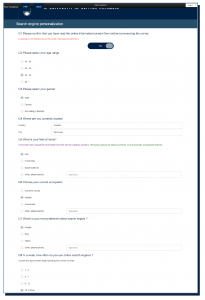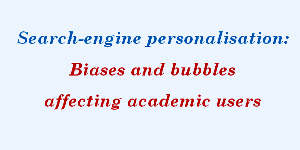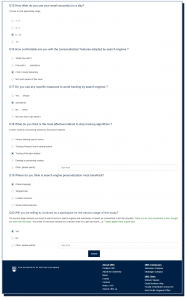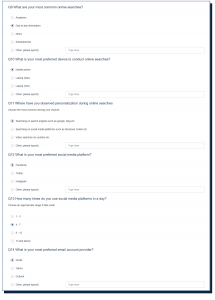This was to be a research activity in LIBR507 Methods of Research and Evaluation in Information Organizations. I chose to do this as an individual activity on my initial topic choice which was Privacy Vs Security Vs Personalisation: When does online information cease from being just information and turn into a peril to personal space and freedom.
In the first stage, I identified and specified the research question within two double-spaced pages. After receiving feedback from the instructor, I proceeded to provide Evidence-based Structured Summaries, critically evaluating existing literature in my chosen area.
The salient components of the research design report were to be ;
- The purpose/problem statement.
- Statement of ethics/concerns.
- Written set of instructions on how to gather the data.
- Description of the sampling strategy and why it was chosen.
- Concluding section on how results are analyzed/interpreted.
- Copies of questionnaire/interview schedule/interview scripts, etc. (One blank, the second filled in with exemplary data.)
- Data coding sheet.
- Copy of the “Certificate of Completion” for “The TCPS 2 Tutorial Course on Research Ethics (CORE).
The following three questions were originally identified ;
- When and under what constraints does online/geographic (video) surveillance turn into a clear breach of personal space and privacy? What can be done to mitigate the effects when that happens?
- Is personal/national security compromised or enhanced under the current philosophy of invasion into personal space as implemented by social media, governmental organizations, and online search engines? If compromised what measures can be taken at an individual / national level to diminish / even nullify such a possibility?
- What constitutes ‘justifiable personalization’ of information as gathered by search engines and when does such ‘personalization’ cease being acceptable? Are all cookies ‘bad’ or snooping in nature?
Due to time constraints as suggested in the course instructor's feedback, I narrowed down to two issues of personalization namely biases and bubbles while using online search engines. The new title was, Search engine personalization: Biases and bubbles affecting academic users.
It was my estimation that this study would involve the adoption of multiple research methods namely;
1. An online questionnaire survey (to serve as an introduction to the study (and to contextualize the data )
2. Online experimental study (to extract the right data/results for the successful completion of the study.)
I developed an online questionnaire (containing 20 pertinent questions) using the fluid survey available at UBC IT services along with a codebook and coding sheet to suitably evaluate the results of the survey when implemented.

A letter of information/consent form, as well as the certificate of completion for the TCPS 2 Tutorial Course on Research Ethics, was also included in the report as required.



This research activity has been much beneficial to me in understanding the various stages involved in a professional research process to ensure a positive/successful research experience. Also, due emphasis was given on research ethics during the course lectures and the issues surrounding the same were reiterated as I went through the TCPS 2 tutorial course on research ethics as a part of the requirement for this research design project.